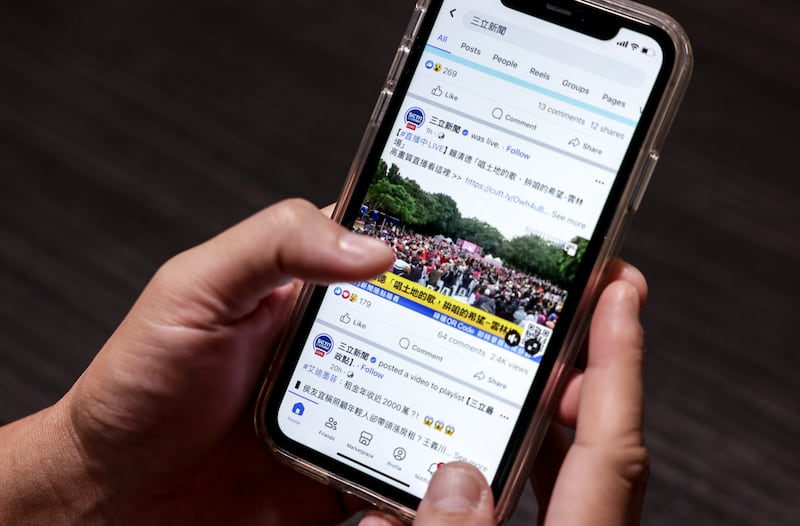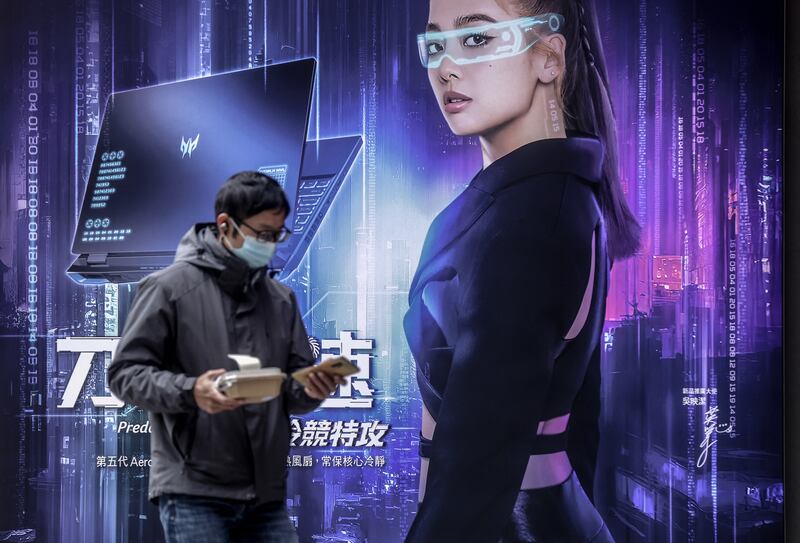TAIPEI, Taiwan – Taiwan said some online influencers have become propaganda tools of Beijing and warned that they will be punished if they break the law after revelations of pay-offs for pro-China messages sparked an uproar on the island.
YouTuber Ba Jiong, whose channel, “Fun TV,” boasts more than a million subscribers, posted a video on Dec. 6 detailing what he said was collusion between some Taiwan influencers and Beijing’s United Front, through which the Chinese Communist Party, or CCP, uses groups and individuals to advance its interests.
The video, which Ba Jiong said “reveals how China’s United Front Work Department buys off Taiwanese influencers,” caused a sensation, getting more than 2 million views in two days and sparking heated debate.
The government of self-ruled Taiwan, which has been at loggerheads with Beijing for decades, said it was well aware that Beijing was trying to win favor and promote a positive image through online celebrities and it was monitoring developments closely.
“Internet celebrities have become an important part of the Chinese Communist Party’s cognitive warfare against Taiwan and must be taken seriously,” said Taiwan’s Mainland Affairs Council, which oversees cross-strait affairs, on Saturday.
“The Chinese Communist Party is suspected of collaborating with specific Taiwanese internet celebrities, asking them to cooperate with CCP operations, film and disseminate slanderous content about Taiwanese government policies, lure people to go to the mainland for development, and infiltrate Taiwan through ‘United Front’ work,” the administration said.
“If there is any violation of relevant laws and regulations, the government will definitely handle it according to the law.”

Taiwan said accepting funds or instructions from China to spread communist propaganda may violate national security laws, which prohibit establishing, funding or developing organizations on behalf of foreign countries and mainland China or any entities or individuals they may dispatch or control.
China regards Taiwan as a renegade province that must be reunited with the mainland, by force if necessary. The democratic island has been self-governing since it effectively separated from mainland China in 1949 after the Chinese Civil War.
China has long faced accusations of using sophisticated propaganda to sway public opinion in Taiwan. It had not responded to the latest controversy by the time of publication.
RELATED STORIES
EXPLAINED: What is China’s United Front and how does it operate?
Media Watch: Taiwanese YouTubers’ visit to Xinjiang, genuine or propaganda?
Taiwan spy chief warns of sharp rise in Chinese infiltration
Offers made to influencers
The maker of the YouTube video revealing tactics to manipulate Taiwanese influencers enlisted the help of Taiwanese rapper Chen Boyuan, who had a reputation in China of being sympathetic to its aims but agreed to expose the ways China spreads its message.
In the video, a person identified as a member of the editorial board with the Fujian city-based state-run newspaper, The Strait Herald, can be heard telling Chen: “Whatever resources you need, I’ll provide them.”
In another part of the video, a United Front Department staff member said he would “offer extra subsidies for ferry or plane tickets” if Chen brought people to take part in an event promoting the unification of Taiwan with the mainland.
YouTuber Ba Jiong pointed out that China often asks influencers to make cultural content to win over the public in Taiwan and undermine warnings about China’s undemocratic designs.
“Because this is less political, China can use it to appease Taiwanese people by saying that both sides of the Strait share the same roots. As long as politics isn’t mentioned, everyone can be seen as brothers and friends,” Ba Jiong.

Huang Chao-nian, an associate professor at Taiwan’s National Chengchi University specializing in China’s influence, told Radio Free Asia that China is adept at using soft power to cloak its agenda.
“While it may appear as cultural promotion on the surface, it often involves systematic inducements and bribery behind the scenes,” he said.
In 2016, China’s UFWD announced that it had begun to include new media professionals as targets of its propaganda. By 2018, “internet figures” such as social media influencers, internet anchors, video content creators, and professional e-sports players were also formally brought into this scope.
Huang said it was nearly impossible to measure the impact of China’s United Front efforts in Taiwan.
“You have to first identify the goal of each United Front effort, and then look into all the details to be able to make a judgment. For example, small influencers may not have an immediate impact on propaganda,” he said.
“However, by laying this groundwork, China ensures that at critical moments, there will at least be individuals they can mobilize, such as spreading disinformation when necessary,” said Huang.
Strengthening media literacy and building awareness in society was vital to combat Chinese propaganda, he said.
Edited by Taejun Kang.
